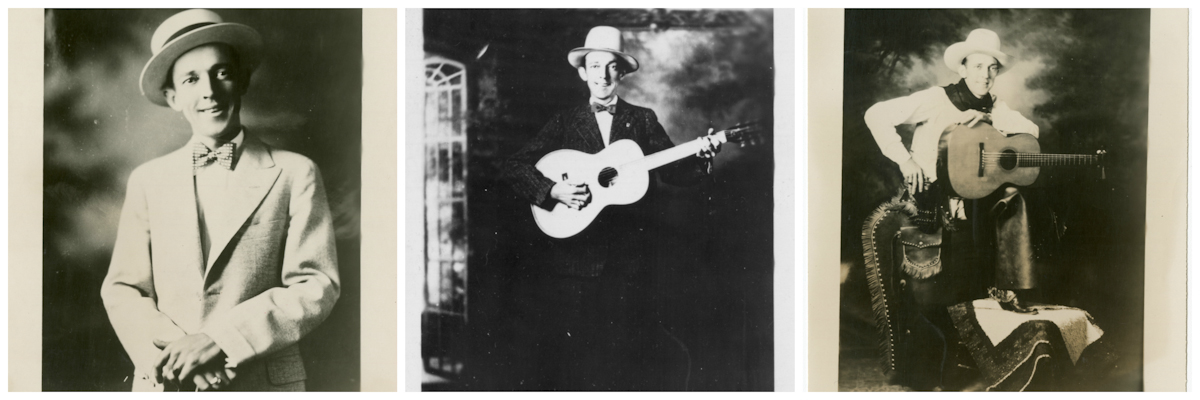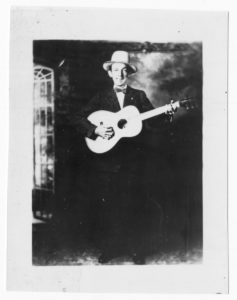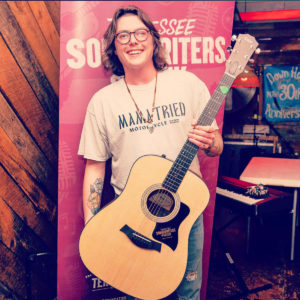Radio Bristol is proud to offer a platform to local and regional artists who are often underrepresented on a national level yet deserving of that audience. In expanding upon Radio Bristol’s core mission, we are pleased to bring you our Radio Bristol Spotlight series, which highlights the top emerging artists in our region. Through interviews and performance, we learn more about the musicians who help to make Central Appalachia one of the richest and most unique musical landscapes in the world.
Recently the Radio Bristol studio hosted ETSU Bluegrass, Old-Time, and Country Music Studies graduate Tyler Hughes who hails from beautiful Big Stone Gap, Virginia. Tyler wears many metaphorical hats – some might even call him a modern-day mountain renaissance man – including songwriter, multi-instrumentalist, square dance caller, music teacher, regional music historian, avid gardener, and social justice advocate. During the pandemic, Tyler also worked as a ranger for Southwest Virginia Museum Historical State Park where he booked musical lineups for events such as Gathering in the Gap.
This past summer Tyler played dozens of events at regional venues and recently even performed at The Grand Ole Opry! While in our studio Tyler spoke with “The Old Ranger” – aka DJ Bill Smith – whose radio program, The Crooked Road Radio Hour, focuses on regional music from the 19 counties that comprise Southwest Virginia along the Crooked Road, Virginia’s heritage music trail. The two chatted about Tyler’s upcoming projects, his musical past, and his latest release, When the Light Shines Again, a collection of tunes centered around coal mining.
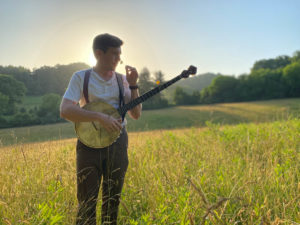
Tyler Hughes enjoying the natural beauty of a Southwest Virginia field. Photo courtesy of Trevor White
On-air, Tyler’s demeanor felt much like the gracious rolling hills of Southwest Virginia – welcoming, sunny, and wise. Accompanied by a dimpled grin and an open-backed banjo, Tyler began his set with some traditional songs. One of particular note was his rendition of “Davenport,” a tune that is possibly a variant of another old melody called “Last Chance,” originally adapted by Scott Boatright, who was a historically important old-time musician from Fort Blackmore, Virginia. Boatright played throughout the 1920s and 1930s, accompanying well-known musicians such as Dock Boggs, Tom Ashley, “Fiddlin” John Carson, Clarence Greene, and Dudley Vance, as well as with his band, The Boatright String Band. Boatright played anywhere he could – at barber shops, barn dances, coal fields, and theaters.
While listening to Tyler, you can hear musical influence from both Boatright and Dock Boggs, as he employs a unique mixture of clawhammer frailing and three-finger “up-picking” banjo technique. It creates a style that feels extremely distinctive, polished, and organic, like a well-worn river rock – smooth, weighty, and comforting.
Talking about his musical inspiration, Tyler enthusiastically spoke about his experience attending The Mountain Music School camp as a young teenager. The camp is hosted annually at Mountain Empire Community College (MECC) and focuses on keeping traditional Appalachian folk music alive through engaging educational programs. Tyler now works on their faculty as a lead instructor and co-director of the Mountain Music School Stringband. While attending camp, Hughes met Boatwright’s daughter Sue Ella Boatright-Wells, who tirelessly worked to promote the preservation of Appalachian music traditions in Southwest Virginia during her 39-year-long service as the Dean of Workforce Development at MECC. Sue Ella was one of several community members who encouraged Hughes to pursue traditional music, and Tyler expressed extreme admiration for her work and character. Her legacy is something Hughes hopes to champion as a musician and educator. Indeed, in his online bio Tyler states: “I believe that through regional arts, Southwest Virginia can move beyond its current challenges, build a new economy and stronger communities where everyone can reach their full potential” – an inspiring mission statement that encapsulates his current work.
Tyler Hughes’ performance of “Sittin’ on Top of the World” in the Radio Bristol studio.
Tyler has recently returned to playing music full-time after wading through the hardships faced by many working musicians during the pandemic. His downtime was extremely productive, yielding a new album, and he has more original music in the works. His latest release was recorded at the legendary Maggard Sound Studio in Big Stone Gap, Virginia, the same studio that produced Dr. Ralph Stanley’s GRAMMY-winning albums. Tyler’s album When the Light Shines Again is a luminous collection of songs that share a central theme of coal mining. Hughes grew up in the heart of Southwest Virginia’s “Coal Mining Country,” and his Papaw was a miner. The concept for the album was born from conversations the two had about his grandfather’s experiences. Tyler’s interpretations feel purposeful and innate, seamlessly churned with care and bearing an unassuming accuracy that exists only through dedicated practice and deep empathy for ancestral wisdom. The recording features excellent musical performances by several members of the old-time music community throughout the region, including Todd Meade, Haselden Ciaccio, Rich Kirby, Stephanie Jeter, and Sam Gleaves.
Amidst the album’s 11 songs, Tyler maps out the complexities of Southwest Virginia’s relationship with coal through songs that explore the cultural, economic, and environmental impact of mining. A stand-out track, “Coal Miner’s Blues,” was first recorded by The Carter Family in 1938 and was collected by A.P. Carter around Lee County, Virginia in the mining community of St. Charles. The song explores tribulation and veneration of the human spirit with rollicking banjo rhythms and mournful lyrics. As a whole, the album depicts different aspects of the coal miner’s experience with songs that follow a 100-year span telling stories of tragic accidents, hardships of physical labor, and the trials faced by unionized workers. To listen to or purchase the album, visit the link here.
Tyler’s work as a budding forbearer of Appalachian folkways follows many different paths. You can find Tyler pickin’ and grinnin’ while playing an archtop guitar, autoharp, banjo, or dulcimer, solo or with accompaniment. He regularly plays with the Empty Bottle String Band formed by musicians he met when he attended ETSU’s Bluegrass, Old-Time, and Country Music program. Tyler also teaches young musicians in Wise County at the after-school music program Junior Appalachian Musicians (JAM) and is a caller for regional square dances. He learned to call square dances after a group of friends couldn’t find anyone to call a dance for them while in college. Tyler began scouring eBay to find old square dance instructional material and picked local callers’ brains, learning customary dances that were common in the Appalachian Mountains. You can catch all of Tyler’s musical performances and dance callings, or maybe even sign up for banjo lessons, through his website here.
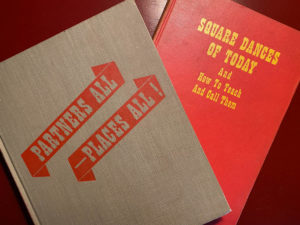
Tyler Hughes’ collection of vintage square dance instructional books. Photo courtesy of Tyler Hughes
Closing out the hour on air, Tyler shared renditions of two Ralph Stanley tunes – “Battle Ax” and “Shout Little Lulie” – with precise clawhammer banjo licks and jaunty singing. Tyler is a regional musician to watch, whose performances offer outstanding musicality and reach into the core of Appalachian life, telling the stories of its people and sharing its rich musical heritage.
* Top image: Tyler Hughes performing with the Empty Bottle String Band at Bristol Rhythm & Roots Reunion in 2019. © Birthplace of Country Music; photographer: Tiffany Bower
Ella Patrick is a Production Assistant at Radio Bristol. She also hosts Folk Yeah! on Radio Bristol and is a performing musician as Momma Molasses.






